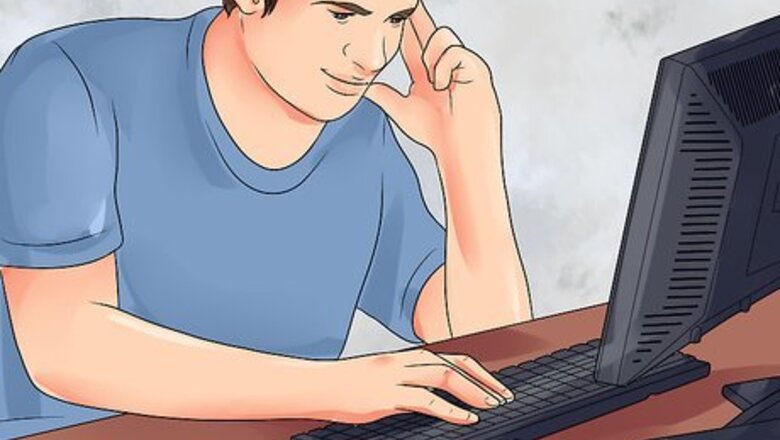
views
Buying a Gun Legally
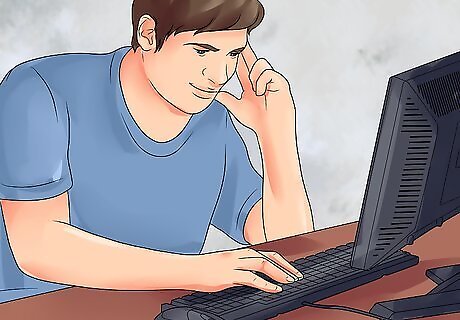
Learn the federal regulations for gun ownership in your country. In some places, it's necessary to acquire a license to handle, own, and carry a firearm, while in other places the restrictions are much more lenient. Specific regulations vary widely. In the US, the minimum age to purchase a firearm varies by state law (a federal law requiring handgun buyers from licensed dealers to be at least 21 was declared unconstitutional) provided they meet the following federal regulations: The buyer must be a current citizen of the United States or a permanent resident (green card holder). The buyer must not be under indictment for a crime punishable by a year in prison, or to have been previously convicted of a crime with a similar punishment. The buyer must not have a current restraining filed by an intimate partner or child, and the buyer must not have been convicted of domestic violence. The buyer must not be a fugitive, or a user of controlled substances. The buyer must not be committed currently to a mental institution.

Learn the local regulations in your state. State and municipal laws are generally more specific and restricted than federal laws, making it essential that you consult the local guidelines to learn about what you do and do not need to do to make a gun purchase legal. In the US, no federal license is required to own a gun. Likewise, most states do not require licenses for gun ownership, but most states require a license to carry a weapon concealed on your person, or displayed prominently. Learn about the specific laws in place in each state by clicking here. Few states will require waiting periods, before which you must pay for the firearm fully and submit the necessary paperwork, then wait for a period of a few weeks before being permitted to take your new gun home with you. In some states, regulations are also in place to check up on safety precautions, ensuring that you also purchase gun locks, own safes, and practice gun safety before you're allowed to purchase a gun legally.
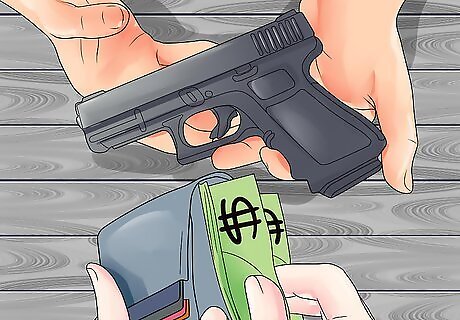
Buy a gun from a licensed retailer if required in your state of residence. In the US, gun retailers need to have a Federal Firearm License (FFL) to sell firearms legally. Every seller of firearms should be willing to provide proof of license, if asked. Much has been made of the "gun show loophole," through which guns are supposedly sold without the necessary regulations at gun shows, under the table. While sometimes private sellers (meaning non-FFL licensed citizens) are sometimes allowed to sell guns and antiques at gun shows, make your purchase from a licensed FFL dealer and you won't have anything to worry about. Ask about the retailer's licensing status and make sure you fill out the proper paperwork and receive a bill of sale. However you choose to purchase a gun, make sure every gun you purchase has a registered serial number and a bill of sale.
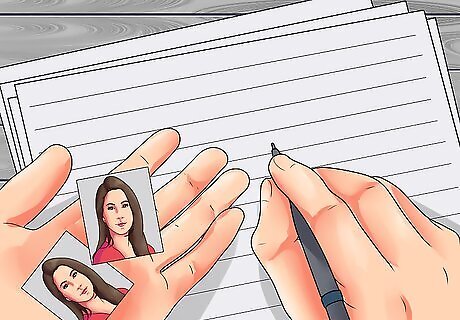
Provide the necessary information. When you're buying a gun from a licensed retailer, you'll have to provide more than a handshake and money. Identification and confirmation of the above Federal guidelines regarding firearms will need to be provided. This process will vary from country to country. In the United States, you'll need to furnish a photo ID and fill out Form 4473. This is used to confirm your status as a citizen who is qualified to own a firearm in the United States. These forms are kept on file at gun stores, to make records easily available to the Bureau of Alcohol, Tobacco, Firearms, and Explosives (BATFE), if necessary. If and when a gun store closes, these forms become the property of BATFE. From this information, licensed retailers perform background checks, in the event that you're trying to purchase a handgun. Background checks are performed through the National Instant Criminal Background Check System (NICS), and are required any time you want to purchase a handgun. Background checks and waiting periods aren't one in the same. In some places, the background check will come back immediately, while in others it may take up to three or four days if the system is bogged down. Eventually, the response should come back "approved," "disapproved," or will come back with a "delay," which means that more investigation is required. This will all need to happen before a waiting period takes effect.

Know your rights when it comes to private purchases. In some places, it's legal to buy used guns from an individual in the same state, who will not require you to submit to a background check before making the sale, or declare the sale. It is, however, illegal for private sellers to sell to individuals who don’t fit the federal requirements for gun ownership, so know that the lack of oversight in no way excuses you from Federal regulations. Owning a gun will still be illegal if you buy it privately and don’t meet the regulations. If you purchase a gun privately, you need to document the sale yourself by procuring a bill of sale from the county clerk’s office in your area, and it’s probably a good idea to register the firearm locally. This will ensure that there’s a traceable record of the purchase. If your locality does not require that your gun be registered, you are not required to do so by federal law. Be sure to check your local and state laws about private party gun sales prior to purchasing a gun from an individual. If you are purchasing via online sale, especially if the gun is from another state, you will probably need to get an FFL dealer involved in the transaction to ensure the sale is legal.
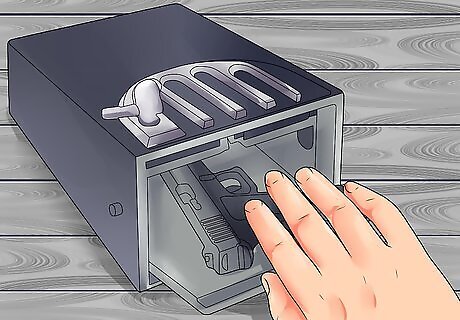
Store your gun safely. Guns purchased either new or used need to be stored properly, both to maintain the life of the firearm and to ensure the safety of you and your family. Guns should be stored unloaded, in locked gun cases, and preferably with trigger-locks in place over the triggers. Most new guns should come with cases, especially handguns which will come with lock-boxes for easy storage. If not, though, you'll need to purchase a case in addition to purchasing the gun. Hard-plastic cases and soft cloth cases are both good for protecting your firearm. If you've got a big collection of firearms, consider storing them in a gun safe. Some high-end models are temperature-controlled, helping to maintain the life of antiques and keep them safe.
Buying a Rifle
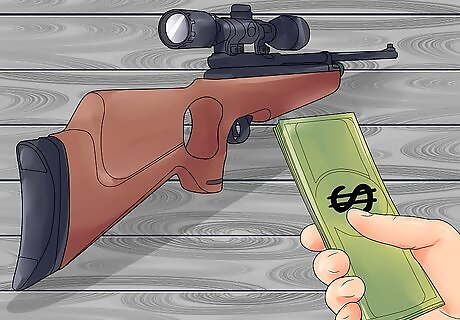
Buy a rifle for hunting small game and target shooting. Rifles, sometimes called "long guns," are most commonly used for hunting purposes and sport shooting, and make excellent guns for beginners. Rifles are the most accurate style of gun, due to the "rifling" spiral of the barrel, which is long enough to result in very accurate shots. Modern rifles are accurate and effective for very long distances, depending on the style of rifle and the caliber of the ammunition used. Whatever your reasoning for wanting a gun, a rifle is a smart purchase.
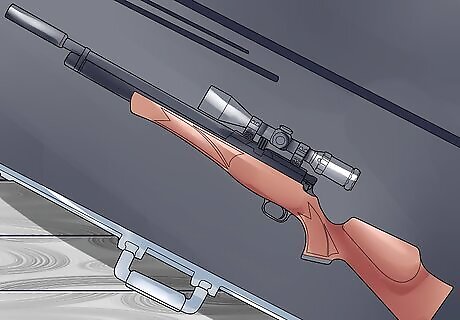
Select a caliber based on your needs. The caliber of a rifle refers to the size of the diameter of the barrel, and the corresponding ammunition used in the gun. While there will be a variety of different ammunition styles within a given caliber, the caliber itself will tell you much about the shooting power of the gun. Most rifles owned by are either .22 or .30 caliber. .22 is the most common caliber of rifle sold for beginners. It's a relatively small caliber, with low recoil and high accuracy, but still powerful enough to use for hunting small game. If you want to hunt deer or larger game, a larger caliber (.30) is more appropriate for the gun to be humane and effective.
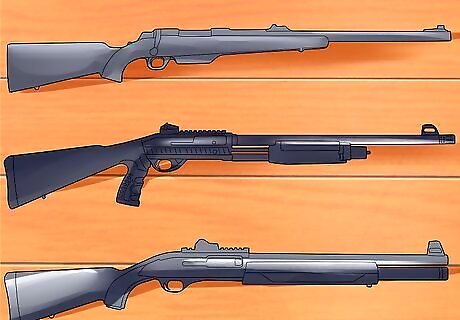
Select an appropriate loading action for your purposes. The style of rifles varies mostly in regard to how the rifle is loaded and how ammunition is advanced into the chamber to be fired. Partly aesthetic and partly practical, the choice is ultimately up to you. There's no "correct" choice. Bolt-action rifles require you to retract a side-mounted bolt to eject each spent cartridge, and then advance a new cartridge into the chamber by racking it back forward. Semi-automatic rifles use the force of each shot to expel the spent shell and advance a fresh shell into the chamber without the need of doing anything manually. Each time you pull the trigger, the gun should fire until the magazine is empty. Hybrid models, repeating rifles, lever action rifles, and many other varieties are also available, if slightly less common than the standard bolt-action and semi-auto. Shop around and try out more obscure guns to suit your purposes.
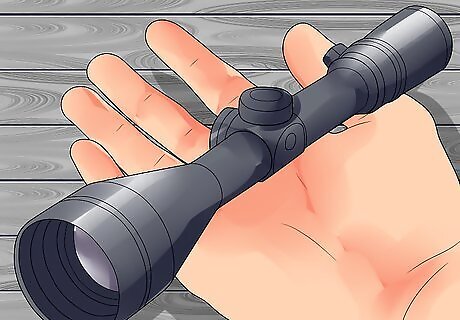
Consider investing in a scope. A rifle is only as good as your ability to aim it accurately. Depending on why you want the rifle, you might find it appropriate to invest in an additional telescopic rifle scopes which you can mount on top of your rifle and drastically improve the accuracy of the gun.
Buying a Shotgun
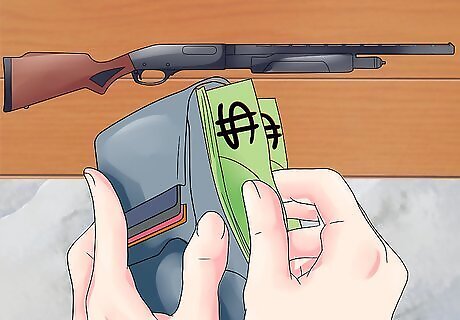
Buy a shotgun for hunting birds and sport shooting. Shotguns are also long guns, which look much similar to rifles, but feature a lot more recoil and fire a different type of ammunition. While rifles shoot bullets, shotguns shoot plastic shells that are loaded with shot, tiny pellets that expel from the shell in scattered pattern. Shotguns are used for hunting birds, particularly duck, pheasant, and geese, as well as for shooting skeet and other types of sport shooting and home defense.
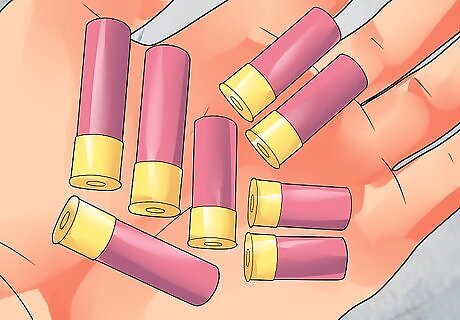
Match the gauge to your power needs. Like the caliber, the gauge of the shotgun refers to the diameter of the shell that will be used. You must only use ammunition of the corresponding gauge in a shotgun. The lower the number in the gauge, the more powerful the shot. 12 gauge shotguns are the most common variety of shotgun, but are somewhat more powerful than what most people might need or want out of a gun. A 20 gauge might be considered a medium-gauge, while a 410 is a light gauge common for young hunters and beginners who're more interesting in shooting for sport or varmint control. There are lots of other considerations when it comes to choosing shotgun shells, including the length of the shell and the "shot count" per shell. Shotguns offer a lot of versatility with each style of gun.
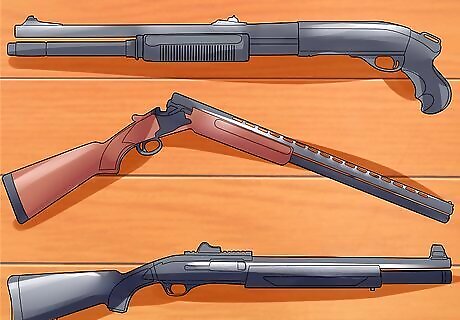
Select an action. Shotguns come in a wide variety of styles, single-barrel shotguns, double-barrel shotguns, oriented either side-by-side or over-and-under. The biggest difference in how you'll actually use a shotgun, however, has to do with the action. Like a rifle must be reloaded in a number of ways, so must a shotgun. Most shotguns are either pump-action or break-action. Pump-action shotguns are iconic on account of the barrel-mounted slide, which advances a shell into the chamber and expels the spent shell when racked by sliding it backward and then forward. Common in movies, these shotguns are reliable and extremely popular. Pump action shotguns can hold between two and twelve shells in the gun at once, depending on the model. Break-action shotguns are reloaded by releasing a spring-mounted hinge that allows the barrel to partially separate from the stock and eject the spent shells. To reload, the shooter simply places a new shell in manually. Most double-barrel shotguns will be break-action. Semi-automatic shotguns reload in the same way that a rifle does, automatically expelling the spent shell and chambering the new. The difference between a semi-auto and a straight-automatic is that the semi-auto requires you to pull the trigger every time you want to shoot, while an automatic would continually fire if you held it down.
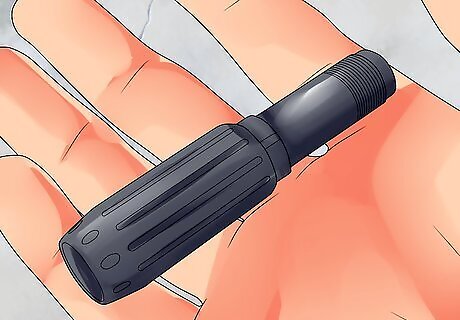
Consider adding a choke. Choke tubes are roughly four inches long, but can make a world of difference when it comes to the efficacy of your shotgun. Chokes come in a variety of sizes, some more "open" and some more "tight." The choke affects the spread of the shot pellets when each shell is fired, meaning that some chokes can allow you to keep a tighter and correspondingly more powerful configuration of shot, while others will allow it to spread out to a wider area, meaning you'll be more likely to hit your target.
Buying a Handgun
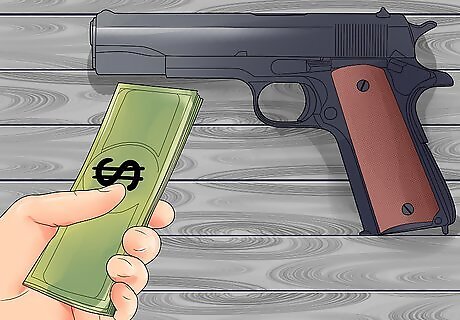
Buy a handgun for target shooting and home defense. Handguns are compact and high-impact, popular for both target and trick shooting, as well as personal and home defense purposes. Handguns might be the most controversial of all the varieties of guns, short of automatic weapons, and also some of the most regulated. Knowing a bit about the basics of handgun ownership will help you to make the most informed choice.
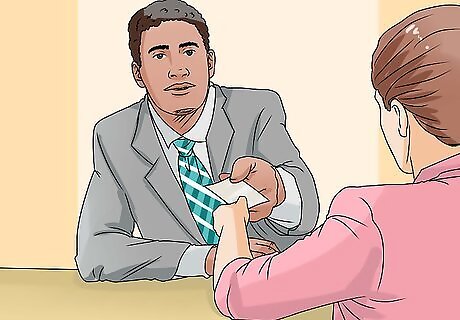
Be prepared to submit to a background check. All handgun-buyers must submit to a background check before being permitted to buy a handgun. The same information will be provided as when you purchase any FFL firearm, but there will also likely be a waiting period and a more thorough background check completed into your record.
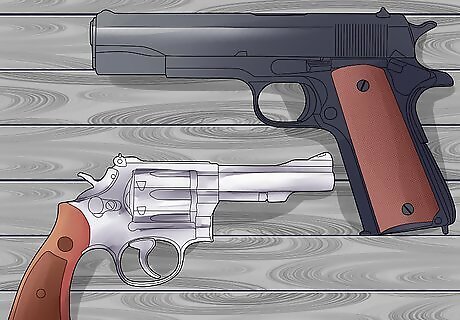
Match the caliber to your purposes. Handguns come in a wide variety of calibers, just as rifles do, and are measured in the same way. The caliber of the gun refers to the diameter of the barrel and the corresponding ammunition that will be used. Depending on why you want to purchase a handgun and what you intent to use it for, the caliber of the handgun is an important consideration. .40 caliber and 9mm pistols are extremely common in law enforcement and as conceal and carry weapons. For many gun-owners, guns with a lower caliber than this are ineffective for use in home defense. .38-.44 caliber pistols and above are typically used for home defense purposes. The recoil and the power of these guns is quite large, making it somewhat excessive for those interested in guns for conceal and carry or sport purposes.
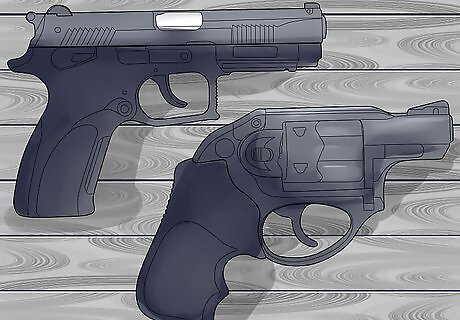
Decide between a semi-automatic pistol and a revolver. Both kinds of handguns are iconic pistols in Hollywood. Cowboy shooter like Dirty Harry or a semi-auto like James Bond? Whether you want to spin the chamber or rack the slide, you can get a reliable gun. Semi-auto pistols are magazine-loaded, the chamber fed by pre-loaded magazines that hold between 9 and 12 shots. To fire semi-automatic pistols, the slide on top of the gun needs to be pulled back to advance a bullet into the chamber and depress the hammer. Revolvers hold between 5 and 9 shells and advance by rotating in a clockwise motion, advancing through the chambers. To remove the spent shells, the revolving chamber is rotated to the side and the shells are emptied manually. The hammer is likewise pulled back manually on a revolver.
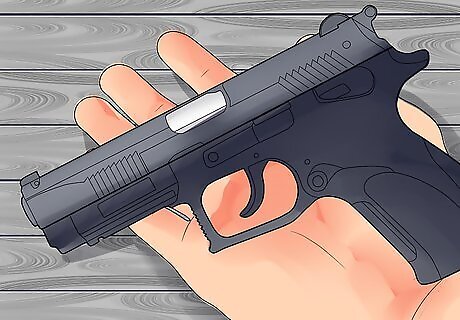
Hold the gun before you buy it. Handguns need to be matched to your body style and your strength a lot more than most other varieties of gun. It's important to hold a gun first and make sure it feels comfortable in your hands before making a purchase. Ideally, you should be able to fire the weapon a few times to make an informed choice. For this reason, gun ranges are typically the best places to try out guns in a safe and supervised environment. Gun stores Gun shows Shooting ranges Antique or exchange stores Military surplus stores
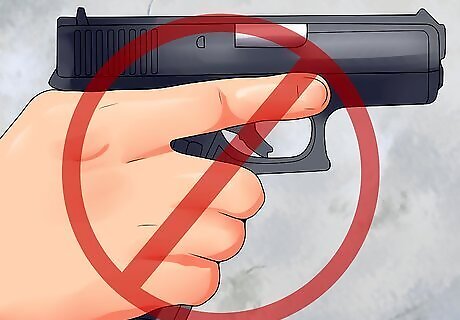
If your state requires a permit, don't carry your weapon until you've received it. If you're buying a pistol because you want to carry it on your person, research the regulations in your area and receive the necessary training to make it legal.



















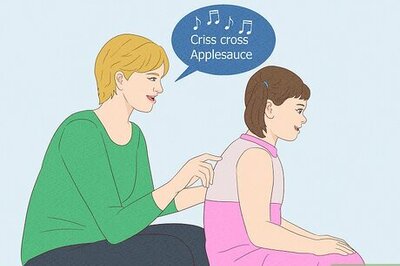
Comments
0 comment